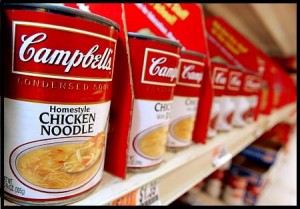Health Watch: Canned Foods and Your Children
A story from the recent Small Print archives.
BPA in can lining linked to health and development risks in infants, babies, children
People reaching for a wholesome can of soup or a nourishing tin of vegetables may be shocked to learn that their healthy choice might have some not-so-healthy contaminants in it.
Most canned goods on the market are lined with resins containing BPA (bisphenol A), a hormone disruptor that has been linked to cancer, obesity, delay or disruption of neurological development, early puberty, reproductive disorders, and diabetes. The effects of BPA are most significant in infants and developing children.
Many people remember BPA as being the now-banned substance formerly found in plastic baby bottles, drinking cups, and Nalgene-style water bottles. In 2010, the Government of Canada declared BPA a toxic substance. Much of the world has since followed suit.
So what is it doing it doing in most of the canned goods on the market?
Food packaging and food production companies argue that the resins used in canned foods are inert – that they don’t leach significant levels of BPA – and that it would take the consumption of hundreds of kilograms of canned goods to pose any health risks. They also claim that BPA is processed and rapidly excreted through urine.
Several significant studies have recently challenged these claims, including a Harvard Medical School paper from last year that showed a dramatic increase in BPA levels in people who regularly ate canned soup. In one experiment, researchers found over 1000 times as much BPA in the urine of people fed canned vegetable soup once per day for 5 days, as compared to people fed the same amounts of fresh vegetable soup. The study, published in the Journal of American Medical Association, is one of the first to measure BPA urine levels soon after the consumption of canned foods.
There is also the issue that, even if BPA is rapidly excreted, levels of the substance can remain high within the human body through continued exposure to it. A day that might feature a glass of apple juice for breakfast, some soup or canned pasta for lunch, and some canned veggies at dinner would make for a continued significant toxic presence.
“It should be noted that more and more companies are beginning a voluntary phase-out of BPA in their canned goods,” says Dr. Chris Metcalfe, a Professor of Environmental and Resource Studies at Trent University, and an expert on the toxic effects of organic contaminants. “But then the question remains, what do you replace them with? It’s something that the industry struggles with. And aiming for a safe replacement can sometimes seem like a moving target for them. This is why so many have been reluctant to change.”
Metcalfe recommends using caution when feeding infants and children canned foods. “Of course fresh fruits and vegetables are going to be a safer and more nutritious bet,” he advises.
He also advises mothers and expectant to watch what they eat. “BPA can be transferred through breast milk,” he explains. “And is also trans-placental, which means that mothers can transfer it to their unborn children as well.”
So what is a consumer to do? The safest bet would be for parents to try to eliminate canned goods from the family diet. This means switching to fresh, frozen, or dried foods, rather than canned. On the plus side, both fresh and frozen fruits and vegetables will contain more of their original nutrients than the canned varieties, so everyone in the family gets a healthy boost.
An inexpensive option is to freeze local fruits and vegetables while they are in season. Not only will you be sure that they are at their freshest and most nutritious, but you will also have a better idea of where your food is coming from.
More and more soups are now available in cartons rather than cans. Look for this to become a trend. As for canned pasta? There aren’t a whole lot of nutrients in these instant entrées – and what there is can easily be replaced by a combination of frozen or dried pasta and jars of sauce.
Finally, you can look for companies that offer BPA-free cans. While these products remain in the minority, they can often be found in health food stores or in the organic/specialty aisles of major grocery stores.
There are still plenty of ways to have a nice, healthy bowl of soup.
One thought on “Health Watch: Canned Foods and Your Children”
Comments are closed.


I very rarely eat canned foods any more because of the plastic liner. Why keep eating things that make a person toxic. I am glad to see the BPA in the liners are being phased out.
I focus on fresh foods – vegetables, fruit, organic meat and make some quick soups with frozen organic mixed vegetables, herbs and some tomatoes, organic meat if I want. It beats canned food any day. I would encourage anyone to do the same. Your body will thank you.